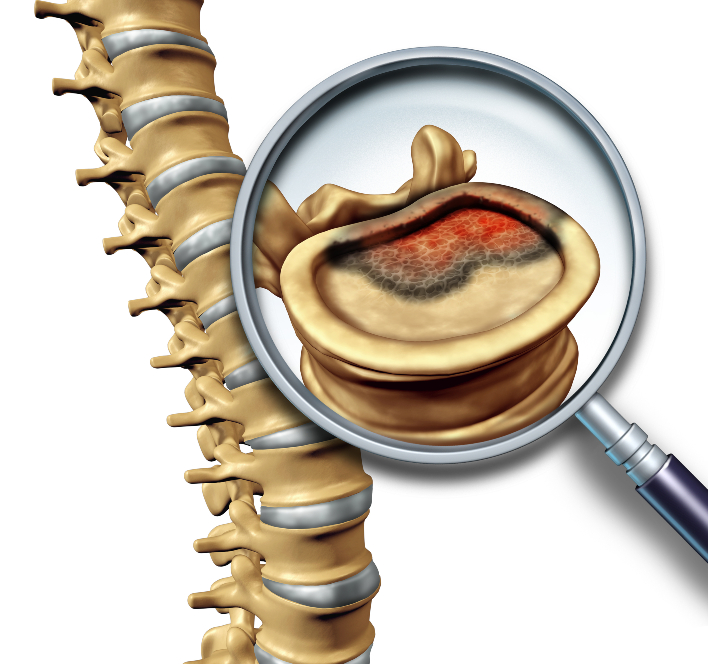Back pain is an incredibly common condition, affecting millions of people worldwide each year. While most episodes of back pain resolve on their own with rest and conservative care, there are cases where the discomfort…
Spinal cancer is a type of cancer that causes an abnormal growth of tissues and cells within or around your spinal column. The spine contains many bundles of nerves, cells, and tissues that make communication between the brain and the nerves throughout your body possible. When these cells grow and multiply uncontrollably, it may possibly lead to spine cancer.
Spine cancer can affect people of all ages and, if left unchecked, can seriously threaten the patient’s health. That’s why it’s crucial to seek help from a spine expert before your condition worsens. In this spine cancer treatment guide, we’ll help explain everything you need to know about spine cancer treatment and how the spine experts at Orthopedic & Laser Spine Surgery can help.
Types of Spinal Cancer
There are different types of spinal cancer. Doctors categorize them depending on a wide range of factors, which include:
- The type of tumor
- The tumor’s location within your spine or spinal column
- The tumor’s location within your spinal column
- The source of the tumor
Your doctor will consider all of your symptoms in order to determine what type of cancer you have before proceeding with the best treatment approach.
What Causes Spinal Cord Cancer?
Unfortunately, the leading cause of primary spine cancer is still unclear. However, most cases of spinal cancer are secondary, which means they spread from other affected body parts and then into the spine. Therefore, you’re more likely to develop spinal cord cancer if you or a family member have a history of other cancers. Here are other risk factors that may lead to spinal cancer:
- Genetic conditions, such as neurofibromatosis (NF2)
- Exposure to chemicals
- Radiation therapy
- Compromised immune system
It’s rare for people to develop primary spine cancer, as most spinal tumors are non-cancerous. However, exposure to the risk factors above can increase your chances of developing primary spinal cancer. Working with a spinal specialist can help you determine what kind of cancer you may have, as well as how to best treat it.
Potential Signs and Symptoms of Spine Cancer
The symptoms of spine cancer depend on a wide range of factors, including the type, extent, and location of the tumor. However, the most noticeable sign is back pain. When you have spinal cord cancer, the tumor presses against the sensitive nerve endings, often causing pain. This pain may be more severe with increased activity or when lying down.
Other signs of spine cancer may include:
- Numbness or inability to move your legs, arms, or chest
- Muscle weakness
- Difficulty walking
- General loss of sensation
- Loss of bladder or bowel control
- Stiffness in your back or neck
- Muscle twitches or spasms
- Scoliosis or other spine deformities
If you start experiencing any strange symptoms, you should schedule a screening for spinal cancer, whether you have a history of cancer or not.
Treatment Options for Spine Cancer
Depending on the nature and severity of your spine tumor, your doctor may recommend one or more treatment options. The selected treatment usually incorporates the expertise of several medical specialists, including spinal surgeons, radiation oncologists, medical oncologists, and many more. Here are the different treatment options for spinal cancer.
Non-Surgical Treatment
Some non-surgical treatment options for spine cancer include:
- Observation and monitoring: Spine tumors that are asymptomatic or don’t show signs of progressing may be observed and monitored with regular imaging tests. Your doctor will closely monitor your cancer cells for any sign of growth or spread.
- Chemotherapy: This is the most common treatment option for many cancers, including spine cancer. It involves taking anti-cancer drugs that can destroy cancer cells in your spine and throughout your body.
- Radiation therapy: This involves using X-rays to shrink or destroy tumor cells. It works to slow the tumor’s growth and eliminates or reduces the symptoms. Radiation therapy is ideal when removing the tumors without significantly damaging the spinal cord is impossible.
Doctors mostly recommend non-surgical treatments before opting for surgical treatment. Surgery may be the only viable treatment option if the tumors don’t respond well to non-surgical options.
Surgical Treatment
Surgical treatment is often recommended for primary spine cancer or when the tumor resists non-surgical methods. Surgical treatment usually involves trying to entirely remove the cancerous tumor. This helps alleviate the symptoms and improve the stability of your spine. Your doctor may recommend open surgery or a minimally-invasive technique.
Surgical treatment can also include removing the surrounding vertebrae or tissues pressing up the spinal cord and nerves. This aims at relieving pain by reducing pressure on the spinal nerves. It can also help prevent the buildup of cerebrospinal fluid and relieve any other symptoms caused by the tumor.
Contact an Experienced Spine Doctor at Orthopedic & Laser Spine Surgery Today
Learning that you have spine cancer can be very overwhelming. However, you don’t have to go through it alone. There are various treatment options that can help alleviate the symptoms and eliminate the cancerous cells. At Orthopedic & Laser Spine Surgery, we are ready to work with you to design effective spine cancer treatment options to help you regain your health.
Our spine doctors offer some of the most effective spine care and utilize the latest technology and therapeutic techniques to help you with any spine condition, including spine cancer. Call us today at (855) 853-6542 or contact us online for help from the most experienced spine tumor doctors.

